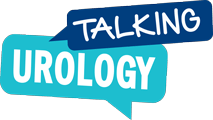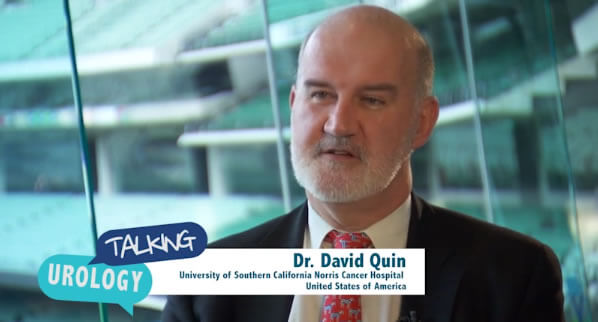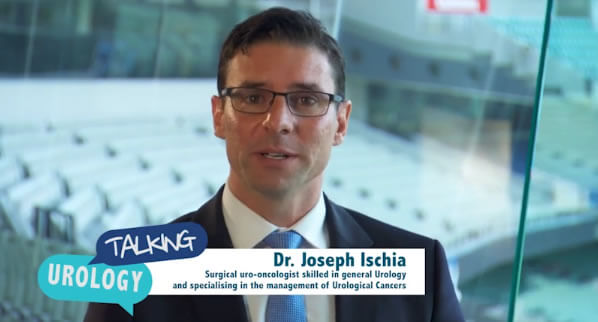In this ANZUP conference highlight, Andrew Weickhardt chats with Australia’s very own Ian Davis about ANZUP’s successful world leading phase 3 study, ENZAMET. Ian outlines ENZAMET for men with newly diagnosed metastatic hormone naïve prostate cancer and how it differs from the other trials involving second line anti-androgens in this space. Ian also discusses how you might decide between the myriad of treatment options that have now shown effect in the upfront hormone naïve metastatic setting.
Professor Ian Davis is a medical oncologist and is Professor of Medicine and Head of the Eastern Health Clinical School, Monash University & Eastern Health, in Melbourne Australia. He is an NHMRC Practitioner Fellow. He hols honorary appointments with the Olivia Newton-John Cancer Research Institute (formerly Ludwig Institute for Cancer research) and Austin Health, is an Associate Professor of the University of Melbourne, and Associate of the University of Sydney. Hi s primary clinical interests are in urologic cancer and melanoma, and his primary research interests are in cancer immunology and the biology of urologic cancers.
Talking Urology podcast transcript
ANZUP 2019 Interviews – A/Prof Andrew Weickhardt & Prof Ian Davis
Dr Andrew Weickhardt: I’m Andrew Weickhardt, medical oncologist, and I’m here with the chair of ANZUP, Ian Davis, to discuss the exciting recent study led by hands up Enzamet. Thanks for joining us for Ian.
Professor Ian Davis: Thanks Andrew. Great to be here.
Andrew: Can you summarize Enzamet and the main takeaway points that we need to know about?
Ian: Yes, it’s been an exciting here year. Here we are on July 2019 at the ANZUP annual scientific meeting. Most of activity this year had ended up actually being sort of overshadowed by the success that we’ve had with the Enzamet clinical trial. So, I put briefly, Enzamet was a clinical trial involving men with metastatic hormone sensitive prostate cancer, so men whose prostate cancer has spread but they’ve not yet had hormonal therapy for this cancer. The standard of care in this situation is to use testosterone suppression with or without a standard anti-androgen drug added to that. We asked the question whether the addition of another drug, Enzalutamide, in this situation might actually improve outcomes for these men. We know that Enzalutamide is valuable much later in the disease course when men have castrate-resistant prostate cancer. But this study was about bringing it earlier as we have done with other medications like Docetaxel chemotherapy to see if could improve overall survival and there are a range of other endpoints as well.
Andrew: What were the main findings of the study that led to so much press and coverage recently?
Ian: Right, so we completed recruitment to this study in March 2017 and put on over 1100 patients across Australia, New Zealand, Ireland, UK, Canada and the United States and there was a lot of interest in the outcomes of the clinical trial. Basically, at our first interim analysis, which took place in March of 2019, this is a planned interim analysis, we found a strong signal in favor of the intervention group. So, men who were allocated to the Enzalutamide arm had a 33% improved chance of survival compared to those on the control arm. That translated at the three-year mark to a difference in survival of 72% going up to 80% if you’re on the Enzalutamide arm.
There were a few other areas of interest in this study as well. There’ve been some other clinical trials recently in a similar sort of situation. The ARCHER’S Clinical Trial which also involved Enzalutamide but used a different endpoint, and the TITAN Clinical Trial which used a similar drug called Apalutamide. There are a few distinguishing points between Enzamet and these other clinical trials. One is that our control arm involved a standard anti-androgen, which is not the case in those other clinical trials. The second point and this is probably the main area of interest in the discussions was that about 45% of patients on Enzamet also received concurrent Docetaxel chemotherapy which is really the standard of care these days for men who are fit enough to receive it in the right sort of situation. And so, what we’ve found, as I said, is that Enzalutamide improves outcomes for these men. There was intense interest about whether addition of Enzalutamide on top of Docetaxel and testosterone suppression would result in even further improvement because that was kind of the expectation and made biological sense.
What we’ve found, I think, came as a surprise to many people particularly the United States where the information is presented at the ASCO Conference this year. We’ve found that if you had already made a decision to treat this man with Docetaxel then addition of Enzalutamide did not give us any further detectable improvement in survival and it was associated with additional side effects as well.
Now, there were some suggestions of activity, so we looked at other measures such as how long it took for the PSA to start rising again or other measures of clinical progression. In that situation, there was a clear indication that addition of Enzalutamide to Docetaxel plus testosterone suppression, gave us further benefit but that has not yet translated into a survival benefit.
The clear message out of all of this was Enzalutamide is now another option in this setting in parts of the world where it’s available and that’s not the case yet in Australia. And secondly, that we should not just get ahead of the evidence and assume that combining everything together is going to be any better because it might not be any better and we might actually be doing a disservice to some of our patients by worsening the side effects.
Andrew: Can I ask you that point about the combination of Docetaxel and Enzalutamide and the lack of overall survival seen in that presentation that was given at ASCO and in the publication. Is it possible to say that there will not ever be an overall survival difference or is it too premature to know whether the curve separate?
Ian: We’ve been a victim of our success here in some way. This is our first interim analysis. This is after half of the survival events had happened that we had initially planned and so it’s early. Our median follow up is 34 months. That’s longer than the other studies but it’s still relatively short. There are a lot of men on this clinical trial who continue on treatment who are doing very well, over 60% of men on the Enzalutamide arm continue on that treatment, that means that there’s been no reason to stop. They haven’t had any clinical progression yet that’s resulted in a decision to take them off. It’s still early days and the men who have relapsed and died on the clinical trial were the ones who are most likely to do worse obviously because that’s what’s happened in a relatively short period of time. There’s another group of men with very responsive disease and we haven’t seen the readout from those men yet. It is still possible that this benefit that we’re seeing in progression-free survival might eventually translate into an overall survival benefit as well. But we’d have to see if that’s going to offset the additional toxicity that we see.
Andrew: Talking about toxicity and side effects, what does a clinician need to know about Enzalutamide when it’s used in a hormone-sensitive setting rather than the castrate‑resistant setting? Is there a difference than what were seen in the trial?
Ian: I think really overall, we didn’t see any unexpected side effects with the use of Enzalutamide added to testosterone suppression. It’s a drug that’s been around for a long time, we’re very familiar with it in the castrate‑resistant setting, very similar safety signal in this clinical trial. What we did see was that when it was combined with Docetaxel, we saw worsening of the toxicities associated with Enzalutamide, but also, worsening some of the Docetaxel toxicities and there’s no clear explanation for that at this point.
Andrew: In talking about the side effects, there is some data about fatigue and seizures were they out-of-keeping with what’s seen in the castrate setting or is about the same frequency?
Ian: Probably about the same setting. We can’t do a head to head comparison. Obviously, different populations, but we do know that fatigue is a very important side effect. That’s often underreported in clinical trials, which report Grade 3 fatigue, which is very severe, and often don’t report grade 2 fatigue which to the patients is also quite severe. We did report that and I think that’s an important outcome from this. Seizures happen rarely with Enzalutamide, about 1%. We didn’t see any increase in the in the incidence of seizures.
Andrew: In evaluating how to incorporate this sort of data into our clinical practice, one thing that is important these days is the patient’s perspective and collecting quality of life data. Has that been published yet?
Ian: No, it hasn’t been and that’s our next big job. We’re actually just doing the analysis pretty much as we speak now and we’re planning to present that information later this year, but that information’s not available yet.
Andrew: Since the publication, there’s been a lot of discussion in different forums about the trial and its implications for clinical practice. What are some of the ways that you’ve seen the trial misinterpreted?
Ian: I think one of the commonest questions we’ve asked is not quite what you’re asking me, but probably one of the common questions we’ve asked is, “Okay, what are you going to choose now?” We’ve got Enzalutamide; we’ve got Apalutamide, Abiraterone, Docetaxel itself, maybe testosterone suppression by itself. I think a lot of people kind of say, “Oh, you’re going to show some sort of superiority over these other treatments which we’re never going to be able to do.” One question was, which one would you choose and which one is going to be the best? I don’t think there’s a right answer to that, but also think that there’s no wrong answer. I think there’s really been a fear of missing out from some people, so a man who might have a recommendation from his doctor that he should have Docetaxel for various clinical reasons, should not feel that he’s going to be undertreated. He’s going to get an effective treatment and we’ve got no reason to think that that’s going to be any better or worse than any of the other available treatments. There are no wrong answers here, there are several options.
Andrew: In the Australian healthcare setting, we don’t have access to Enzalutamide, the US does a different equation of course, can I, if the insulin mine was reimbursed and look at Enzamet and say for patients who don’t want to have chemotherapy and prefer to do better than standard ADT, that if they’re given Enzalutamide, they’ll have an equivalent outcome to men who receive Docetaxel to spare them the side effects of chemotherapy? Is there any way to compare those two outcomes with Enzamet?
Ian: Yes. I guess we can say in the control arm who did receive Docetaxel that performed similarly to other clinical trials like chartered where Docetaxel was the experimental arm. We know that Enzalutamide compared to ADT alone, testosterone suppression alone, is superior. We don’t have that sort of direct comparison. I think they’ll be patient-specific reasons why you might choose one agent over another. If there are financial constraints, a short course of very cheap Docetaxel might be a very good option. If you have cardiac failure or diabetes, Abiraterone and Prednisolone might not be the best option. If you’ve got cognitive or seizure risk, Enzalutamide would not be the best option. It’s really going to come down to what’s available and the patient’s preferences and their own situation.
Andrew: Taking another look at the trial, what proportion of men in the standard of care arm switched over to receive Enzalutamide at the time of progression and I’m talking about the percentage of men that had progressed when you performed the interim analysis.
Ian: Yes, this was an open label studies, so we knew exactly what people were getting. Enzalutamide was one of the most common agents used as men did progress on that standard arm. There was no lack of access to other life-prolonging therapies for men on the control arm, so they actually accessed Enzalutamide as well as Abiraterone and Docetaxel and other treatments more frequently than those on the Enzalutamide arm.
Andrew: It seems that what you’re saying is it wasn’t a crossover study that men weren’t automatically to receive Enzalutamide, there was a choice that clinicians had.
Ian: That’s exactly right.
Andrew: What proportion ended up receiving Enzalutamide? Interested to know what portion received the other arm.
Ian: Yes. I don’t know—it’s on my head and I should have looked that up before this interview. I’ll talk to you later.
Andrew: 40% was it?
Ian: It might have been on that order. Yes well done. That was a test from me, you passed it. Well done.
Andrew: Where to from here for trials in the first line setting with hormone sensitive disease because clearly looking at ADT alone you would say that by itself is unsatisfactory now with the data that we’ve got. We have data that suggests that chemotherapy and all these novel hormonal agents. What do you see in five years’ time we’ll be doing with our patients?
Ian: There will be new agents coming along and one agent of intense interest is something like Lutetium PSMA, which was moving earlier in the disease course. We’ve got no idea where that’s going to show. We may have, by then, I hope, some understanding about which patients might be able to respond to immunotherapy. That’s not been brought into the equation yet. Probably the really outstanding question at the moment is what is going to be the optimal sequence for our patients? And I don’t think any of us know the answer to that yet. I do think it’s important though that men get the option to have access to all of those treatments that they are able to at some point during the disease course.
Andrew: Running this trial is a substantial undertaking and for an organization like ANZUP, a pretty amazing effort given the size and complexity. What do you know now about running trials that you didn’t when you first started Enzamet going back to 2013?
Ian: Pretty much everything that I know now I didn’t know when I started this. It was a major learning curve all the way along.
Andrew: Right.
Ian: I’ve been very fortunate to be able to work with great organizations, the NHMRC Clinical Trials Centre at the University of Sydney, Cancer Trials Ireland, Canadian Cancer Trials Group, Dana-Farber Cancer Center. These organizations have made this study an international success, but we’ve also now learned that there’s intense interest in these sorts of trials and we’ve got now a global collaboration that’s able to contribute to future cancers in the gender urinary cancer space future clinical trials. That’s a great and somewhat unexpected outcome that we can use to improve outcomes for men affected and women affected by gender urinary cancers.
Andrew: Thanks Ian. It’s been fantastic having you along to talk about the Enzamet trial. Congratulations on carrying it out and look forward to talking to you about future ANZUP trials.
Ian: All right thanks very much Andrew.










